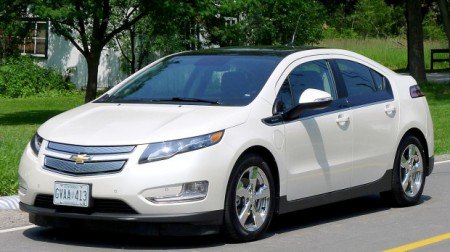It May Lose Money But Chevy Volt is Capturing Prius Owners
Toyota Prius is the Number One Trade-In on the Chevy Volt

There’s been a lot of discussion following our “ The Volt Loses GM $49K/Car” article. Lost in all that hubbub was a little factoid at the tail end of the Reuters piece offered by GM VP Dave Parks, who now heads global product programs and formerly headed the development of the Volt. That factoid is at least a glimmer of hope for the Volt’s ultimate success. Parks said that the most common non-GM car traded in on the Volt has been the Toyota Prius.
Undoubtedly some of those Prius owners have been drawn in by the attractive $199/mo lease rates currently being offered on the Volt. That cheap lease offsets the fact that even after the $7,500 tax credit on the Volt, it’s still about $7K more than the standard Prius. While that discounted price is undoubtedly a factor, it still has to be reassuring to the Volt’s product planners that owners of the Volt’s primary competitor (if not directly in terms of actual feature sets, at least in the popular mind as the two companies’ high profile green cars) are trading in their Priuses on Chevy’s EREV.
It’s also interesting that those trading in a Prius didn’t opt for the new Prius Plug-In, which is probably a more direct competitor to the Volt. Perhaps the Prius owners trading for a Volt were completely swayed by cost factors but in my experience Toyota owners tend to be a loyal lot and I’ve never met a Prius owner who was disappointed in their car (to be fair, every Volt owner that I’ve spoken to has given it glowing reviews, some completely unsolicited).
Bob Lutz has said that he wanted something to leapfrog Toyota, both in terms of tech and in consumers’ minds. With all the sniping at the Volt for it’s cost, the incredibly hyped fire non-issue, and it’s political baggage, if Prius owners are trading in their hybrids for Volts then it appears that the Volt team has succeeded in achieving at least part of Lutz’s aspiration.
Does it surprise you that the #1 trade-in in terms of captured buyers for the Volt is the Prius? Does this bode well for the Volt’s ultimate success? Discuss amongst yourselves.
Ronnie Schreiber edits Cars In Depth, a realistic perspective on cars & car culture and the original 3D car site. If you found this post worthwhile, you can dig deeper at Cars In Depth. If the 3D thing freaks you out, don’t worry, all the photo and video players in use at the site have mono options. Thanks for reading– RJS

Ronnie Schreiber edits Cars In Depth, the original 3D car site.
More by Ronnie Schreiber
Latest Car Reviews
Read moreLatest Product Reviews
Read moreRecent Comments
- Kjhkjlhkjhkljh kljhjkhjklhkjh A prelude is a bad idea. There is already Acura with all the weird sport trims. This will not make back it's R&D money.
- Analoggrotto I don't see a red car here, how blazing stupid are you people?
- Redapple2 Love the wheels
- Redapple2 Good luck to them. They used to make great cars. 510. 240Z, Sentra SE-R. Maxima. Frontier.
- Joe65688619 Under Ghosn they went through the same short-term bottom-line thinking that GM did in the 80s/90s, and they have not recovered say, to their heyday in the 50s and 60s in terms of market share and innovation. Poor design decisions (a CVT in their front-wheel drive "4-Door Sports Car", model overlap in a poorly performing segment (they never needed the Altima AND the Maxima...what they needed was one vehicle with different drivetrain, including hybrid, to compete with the Accord/Camry, and decontenting their vehicles: My 2012 QX56 (I know, not a Nissan, but the same holds for the Armada) had power rear windows in the cargo area that could vent, a glass hatch on the back door that could be opened separate from the whole liftgate (in such a tall vehicle, kinda essential if you have it in a garage and want to load the trunk without having to open the garage door to make room for the lift gate), a nice driver's side folding armrest, and a few other quality-of-life details absent from my 2018 QX80. In a competitive market this attention to detai is can be the differentiator that sell cars. Now they are caught in the middle of the market, competing more with Hyundai and Kia and selling discounted vehicles near the same price points, but losing money on them. They invested also invested a lot in niche platforms. The Leaf was one of the first full EVs, but never really evolved. They misjudged the market - luxury EVs are selling, small budget models not so much. Variable compression engines offering little in terms of real-world power or tech, let a lot of complexity that is leading to higher failure rates. Aside from the Z and GT-R (low volume models), not much forced induction (whether your a fan or not, look at what Honda did with the CR-V and Acura RDX - same chassis, slap a turbo on it, make it nicer inside, and now you can sell it as a semi-premium brand with higher markup). That said, I do believe they retain the technical and engineering capability to do far better. About time management realized they need to make smarter investments and understand their markets better.


































Comments
Join the conversation
"Anyone looking for a clean used Prius, try your local Chevy dealership." It will be parked right next to the Tundra that's been gathering dust on their lot!......LOL On the other side will be the BMW that someone traded in on their Volt. The bigger story is how many curent Volt owners had never stepped foot onto a Chevrolet dealership. Many owned higher end german cars beforehand. How many people are trading NICE cars in on a Prius? It all gets backs to once you drive both you just can't compare that turkey, which drives like its steering wheel is attached to the chassis with a rubber band, to a Volt.
Amazing how many flag-wavers are eager for one of the largest American companies to fail. Also amazing how few point out that spending $30k extra over a $20k Corolla to buy something with a German badge on it, makes no economic sense. OF COURSE, it makes no economic sense! Neither does the Volt at present. But people buy cars for reasons other than maximizing utility and minimizing cost (which would be the Marxian viewpoint, btw.) The Volt itself is a techno marvel and arguably the first such marvel to come out of Detroit in a very long time. As an American, I'm quite willing to celebrate that, and let people who choose to buy one for their own reasons enjoy their purchase. To date, I've not yet met a single unhappy Volt owner, which must be some kind of record for an American car. For those that wanted a hybrid/electric but were forced to buy foreign to get one until now, then traded their Prius for a Volt: Good for You!